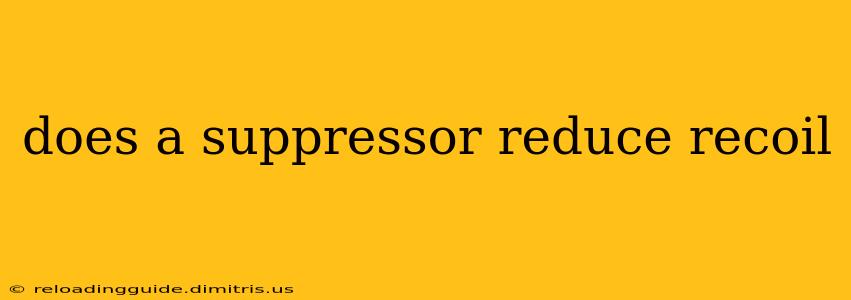Does a Suppressor Reduce Recoil? The Complex Answer
The short answer is: somewhat, but not significantly. While a suppressor (also known as a silencer) doesn't drastically reduce felt recoil, it can have a subtle effect, and the impact varies depending on several factors. Let's delve deeper into the complexities.
How Suppressors Work and Their Impact on Recoil
A suppressor works by slowing down and expanding the gases expelled from a firearm's barrel. This reduces the sound signature, the primary function. However, this gas expansion also affects the recoil impulse. The slight reduction in recoil is primarily due to:
- Reduced Gas Pressure: By slowing down the propellant gas expansion, a suppressor slightly reduces the backward force pushing against the shooter. This effect is minor compared to other recoil-mitigating factors.
- Increased Weight: Suppressors add weight to the barrel, and increased mass can marginally absorb some recoil energy. This is a relatively small contribution compared to the change in gas pressure.
Factors Affecting the Perceived Recoil Reduction
Several factors influence how much recoil reduction a shooter perceives:
- Caliber: The effect on recoil is more noticeable with smaller calibers (.22LR, .223) compared to larger, more powerful calibers (.308, .300 Win Mag). The greater the initial recoil, the smaller the percentage reduction from the suppressor.
- Suppressor Design: The internal design of the suppressor affects its efficiency in reducing gas pressure. Different baffle designs and materials impact the level of gas expansion and, consequently, the recoil mitigation.
- Ammunition: The type of ammunition used significantly influences felt recoil. Heavier bullets or faster burning powders will produce different levels of recoil, making the impact of the suppressor less consistent.
- Individual Shooter Factors: Body size, shooting stance, and experience all play a role in how a shooter perceives recoil. Experienced shooters might notice a smaller difference than novice shooters.
- Weapon System: The firearm itself plays a role. A gun with inherent low recoil to begin with might show minimal change with the addition of a suppressor.
What Does Significantly Reduce Recoil?
While a suppressor provides a marginal reduction, other factors are far more effective at mitigating recoil:
- Muzzle Brakes: These redirect propellant gases to counteract recoil, offering a much more significant reduction.
- Recoil Compensators: Similar to muzzle brakes, but often designed for more controlled recoil management.
- Heavier Barrels and Stocks: Increasing the mass of the firearm absorbs more recoil energy.
- Proper Shooting Technique: This remains the most effective method for managing recoil, leading to improved accuracy and comfort.
Conclusion:
A suppressor offers a minimal reduction in felt recoil. While a slight decrease might be perceived, especially with smaller calibers and experienced shooters, it's not the primary purpose nor a significant factor compared to other recoil-reducing mechanisms. If significant recoil reduction is your goal, consider muzzle brakes, recoil compensators, or improvements in your shooting technique. The suppressor's key benefit remains its sound suppression capabilities.

